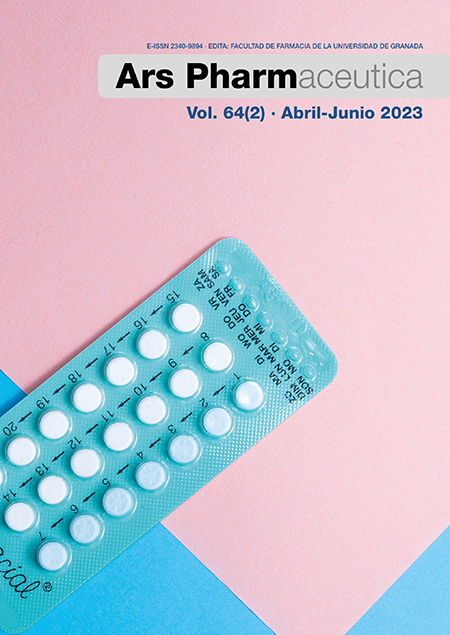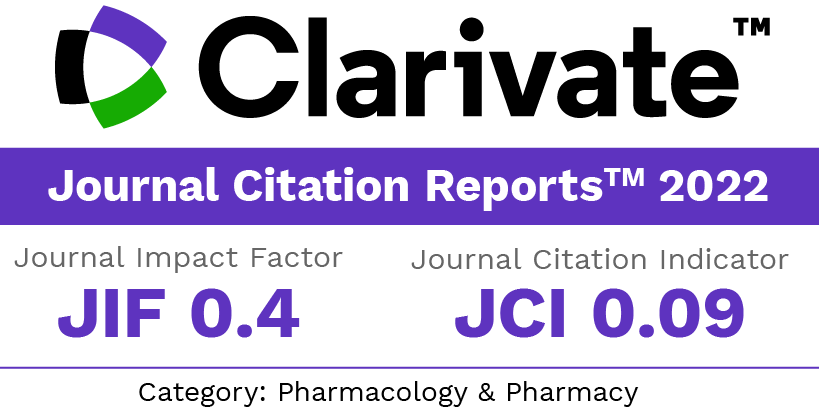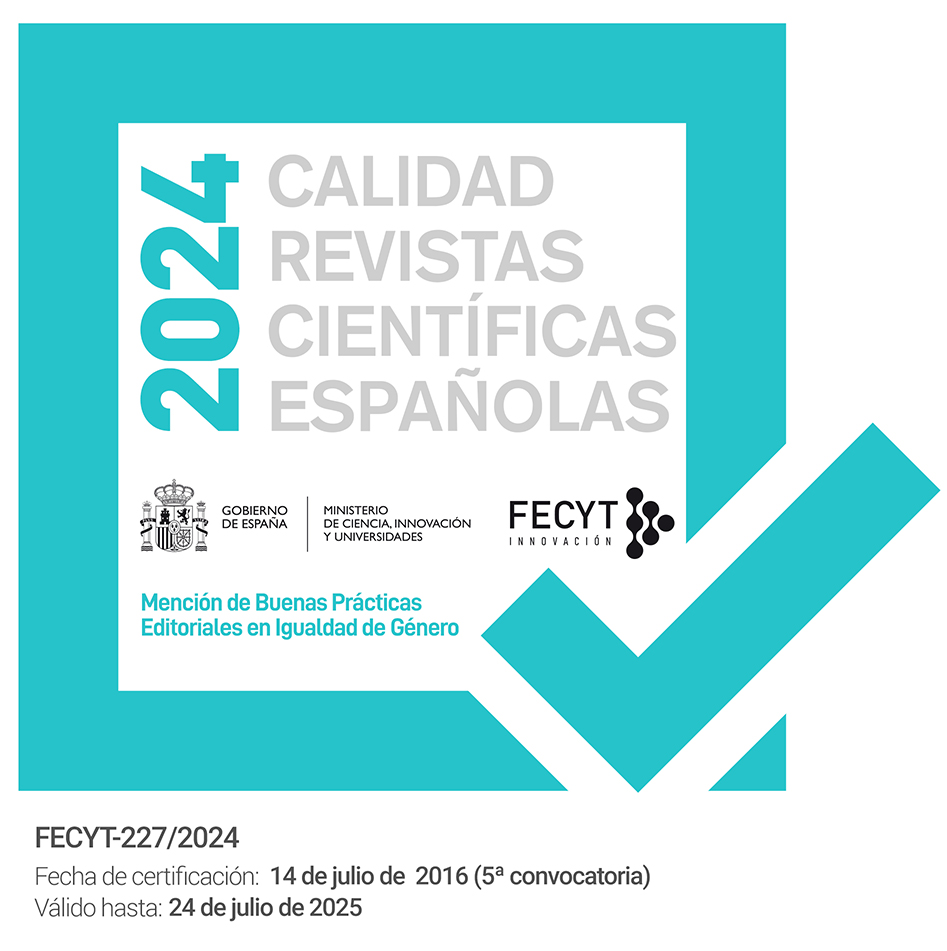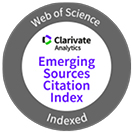Mejorando la calidad de las publicaciones y avanzando en todos los paradigmas de la investigación de la farmacia Asistencial, clínica y social: las declaraciones de Granada
DOI:
https://doi.org/10.30827/ars.v64i2.27182Palabras clave:
Farmacia Asistencial, Paradigma científico, Farmacia social y conductualResumen
La farmacia y las ciencias farmacéuticas abarcan una serie de disciplinas diferentes. La Farmacia Asistencial se ha definido como “la disciplina científica que estudia los diferentes aspectos de la práctica de la farmacia y su impacto en los sistemas de atención de la salud, el uso de medicamentos y la atención al paciente”. Por lo tanto, los estudios de Farmacia Asistencial abarcan tantos elementos de farmacia clínica como de farmacia social. Como cualquier otra disciplina científica, la práctica de la farmacia clínica y social difunde los resultados de la investigación utilizando revistas científicas. Los editores de revistas de farmacia clínica y farmacia social tienen un papel en la promoción de la disciplina al mejorar la calidad de los artículos publicados. Como ha ocurrido en otras áreas del cuidado de la salud (es decir, medicina y enfermería), un grupo de editores de revistas de práctica farmacéutica clínica y social se reunió en Granada, España, para discutir cómo las revistas pueden contribuir a fortalecer la práctica farmacéutica como disciplina. El resultado de esa reunión se compiló en estas Declaraciones de Granada, que comprenden 18 recomendaciones reunidas en seis temas: el uso apropiado de la terminología, los resúmenes con impacto, la necesidad de la revisión por pares, la dispersión de revistas, el uso más eficaz y más inteligente de los indicadores bibliométricos y la selección por parte de los autores de la revista de práctica farmacéutica más adecuada para presentar su trabajo.
Descargas
Citas
McGillivray B, Jenset G, Salama K, et al. Investigating patterns of change, stability, and interaction among scientific disciplines using embeddings. Humanit Soc Sci Commun 2022;9:285.
Biglan A. The characteristics of subject matter in different academic areas. J Appl Psychol. 1973;57(3):195–203.
Becker T. Towards a definition of disciplinary cultures. Studies in Higher Educ. 1982;6(2):109–22.
Lodahl J, Gordon G. The structure of scientific fields and the functioning of university graduate departments. Am Sociolog Rer. 1972;37(1):57-72.
Perry RP, Smart JC. The Scholarship of Teaching and Learning in Higher Education: An Evidence-Based Perspective.Dordrecht, The Netherlands: Springer Science+Business Media; 2007.
Almarsdottir AB, Granas AG. Social pharmacy and clinical pharmacy-Joining forces. Pharmacy (Basel). 2015;4(1.
Holmes ER, Desselle SP. Is scientific paradigm important for pharmacy education? Am J Pharm Educ. 2004;68(5):118.
Marsh HW, Hattie J. The relation between research productivity and teaching Effectiveness. The Journal of Higher Education. 2016;73(5):603-41.
Williams K. Playing the fields: Theorizing research impact and its assessment. Res Eval. 2020;29(2):191-202.
Mendes AM, Tonin FS, Buzzi MF, et al. Mapping pharmacy journals: A lexicographic analysis. Res Social Adm Pharm. 2019;15(12):1464-71.
Sørensen E, Mount J, Christensen S. The concept of social pharmacy. Chronic Illn. 2003;7:8-11.
Garcia-Cardenas V, Rossing CV, Fernandez-Llimos F, et al. Pharmacy practice research - A call to action. Res Social Adm Pharm. 2020;16(11):1602-8.
Kerlinger FN, Lee HB. Foundations of Behavioral Research, 4th Ed. Belmont, CA: Wadsworth; 1999. ISBN: 978-0155078970
Dreischulte T, van den Bemt B, Steurbaut S. European Society of Clinical Pharmacy definition of the term clinical pharmacy and its relationship to pharmaceutical care: a position paper. Intl J Clinical Pharm. 2022;44:1-6.
Scahill SL, Atif M, Babar ZU. Defining pharmacy and its practice: a conceptual model for an international audience. Integr Pharm Res Pract. 2017;6):121-9.
OECD. Frascati Manual 2015: Guidelines for Collecting and Reporting Data on Research and Experimental Development, The Measurement of Scientific, Technological and Innovation Activities. Paris: OECD; 2015. ISBN: 978-926423901-2
Clapham P. Publish or perish. BioScience. 2005;55):390-1.
Desselle SP, Amin M, Aslani P, et al. Moving the needle-what does RSAP look for and what does it aim to do? Res Social Adm Pharm. 2019;15(1):1-2.
Fernandez-Llimos F, Mendes AM, Tonin FS. Confusing terminology used in the abbreviation of pharmacy journal names. Res Social Adm Pharm. 2022;18(8):3463-5.
Fernandez-Llimos F, Garcia-Cardenas V. The importance of using standardized terminology in titles and abstracts of pharmacy practice articles. Res Social Adm Pharm. 2022.
Gernant SA, Bacci JL, Upton C, et al. Three opportunities for standardization: A literature review of the variation among pharmacists’ patient care services terminology. Res Social Adm Pharm. 2020;16(6):766-75.
van Mil JW, Henman M. Terminology, the importance of defining. Int J Clin Pharm. 2016;38(3):709-13.
MacLure K, Paudyal V, Stewart D. Reviewing the literature, how systematic is systematic? Int J Clin Pharm. 2016;38(3):685-94.
Al Saeedy D, Thomas D, Palaian S. Visibility of evidence-based pharmacy on PubMed - Identity crisis? Res Social Adm Pharm. 2019;15(11):1374.
McCann A. Advantages of a universal coding and classification system for drugs. Implications of classification for medical subject headings. Am J Hosp Pharm. 1966;23(2):87-8.
Minguet F, Van Den Boogerd L, Salgado TM, et al. Characterization of the Medical Subject Headings thesaurus for pharmacy. Am J Health Syst Pharm. 2014;71(22):1965-72.
Fernandez-Llimos F, Salgado TM. Standardization of pharmacy practice terminology and the Medical Subject Headings (MeSH). Res Social Adm Pharm. 2021;17(4):819-20.
Minguet F, Salgado TM, van den Boogerd L, et al. Quality of pharmacy-specific Medical Subject Headings (MeSH) assignment in pharmacy journals indexed in MEDLINE. Res Social Adm Pharm. 2015;11(5):686-95.
Tonin FS, Gmunder V, Bonetti AF, et al. Use of ‘Pharmaceutical services’ Medical Subject Headings (MeSH) in articles assessing pharmacists’ interventions. Explor Res Clin Soc Pharm. 2022;7):100172.
Rodriguez RW. Comparison of indexing times among articles from medical, nursing, and pharmacy journals. Am J Health Syst Pharm. 2016;73(8):569-75.
Irwin AN, Rackham D. Comparison of the time-to-indexing in PubMed between biomedical journals according to impact factor, discipline, and focus. Res Social Adm Pharm. 2017;13(2):389-93.
Kronick DA. Peer review in 18th-century scientific journalism. JAMA. 1990;263(10):1321-2.
Kassirer JP, Campion EW. Peer review. Crude and understudied, but indispensable. JAMA. 1994;272(2):96-7.
Schroter S, Black N, Evans S, et al. What errors do peer reviewers detect, and does training improve their ability to detect them? J R Soc Med. 2008;101(10):507-14.
Bailar JC, 3rd, Patterson K. The need for a research agenda. N Engl J Med. 1985;312(10):654-7.
Jirschitzka J, Oeberst A, Göllner R, et al. Inter-rater reliability and validity of peer reviews in an interdisciplinary field. Scientometrics. 2017;113(2):1059-92.
Jefferson T, Alderson P, Wager E, et al. Effects of editorial peer review: a systematic review. JAMA. 2002;287(21):2784-6.
Jefferson T, Rudin M, Brodney Folse S, et al. Editorial peer review for improving the quality of reports of biomedical studies. Cochrane Database Syst Rev. 2007(2):MR000016.
Kovanis M, Trinquart L, Ravaud P, et al. Evaluating alternative systems of peer review: a large-scale agent-based modelling approach to scientific publication. Scientometrics. 2017;113(1):651-71.
Walbot V. Are we training pit bulls to review our manuscripts? J Biol. 2009;8(3):24.
Huisman J, Smits J. Duration and quality of the peer review process: the author’s perspective. Scientometrics. 2017;113(1):633-50.
Mendes AM, Tonin FS, Mainka FF, et al. Publication speed in pharmacy practice journals: A comparative analysis. PLoS One. 2021;16(6):e0253713.
Fernandez-Llimos F. Peer review and publication delay. Pharm Pract (Granada). 2019;17(1):1502.
Aczel B, Szaszi B, Holcombe AO. A billion-dollar donation: estimating the cost of researchers’ time spent on peer review. Res Integr Peer Rev. 2021;6(1):14.
Desselle SP, Chen AM, Amin M, et al. Generosity, collegiality, and scientific accuracy when writing and reviewing original research. Res Social Adm Pharm. 2020;16(2):261-5.
Fernandez-Llimos F, Salgado TM, Tonin FS. How many manuscripts should I peer review per year? Pharm Pract (Granada). 2020;18(1):1804.
Donato H, Marinho RT. Acta Medica Portuguesa and peer-review: quick and brutal! Acta Med Port. 2012;25(5):261-2.
Fernandez-Llimos F. Authors, peer reviewers, and readers: What is expected from each player in collaborative publishing? Pharm Pract (Granada). 2021;19(1):2284.
Desselle SP, Andrews B, Lui J, et al. The scholarly productivity and work environments of academic pharmacists. Res Social Adm Pharm. 2018;14(8):727-35.
Karimi-Sari H, Rezaee-Zavareh MS. Citation metrics for appraising scientists: misuse, gaming and proper use. Med J Aust. 2020;213(5):238-9 e1.
Liu XL, Gai SS, Zhou J. Journal Impact Factor: Do the Numerator and Denominator Need Correction? PLoS One. 2016;11(3):e0151414.
Rossner M, Van Epps H, Hill E. Show me the data. J Cell Biol. 2007;179(6):1091-2.
Fernandez-Llimos F. Bradford’s law, the long tail principle, and transparency in Journal Impact Factor calculations. Pharm Pract (Granada). 2016;14(3):842.
Paulus FM, Cruz N, Krach S. The Impact Factor Fallacy. Front Psychol. 2018;9):1487.
Dougherty MR, Horne Z. Citation counts and journal impact factors do not capture some indicators of research quality in the behavioural and brain sciences. R Soc Open Sci. 2022;9(8):220334.
Ritchie A, Seubert L, Clifford R, et al. Do randomised controlled trials relevant to pharmacy meet best practice standards for quality conduct and reporting? A systematic review. Int J Pharm Pract. 2020;28(3):220-32.
Hirsch JE. An index to quantify an individual’s scientific research output. Proc Natl Acad Sci U S A. 2005;102(46):16569-72.
Directorate-General for Research and Innovation. Agreement on Reforming Research Assessment. 2022; Available at: https://www.scienceeurope.org/media/y41ks1wh/20220720-rra-agreement.pdf. [Accessed 02-Nov-2022]
van Mil JWF, Green J. Citations and science. Int J Clin Pharm. 2017;39(5):977-9.
Minguet F, Salgado TM, Santopadre C, et al. Redefining the pharmacology and pharmacy subject category in the journal citation reports using medical subject headings (MeSH). Int J Clin Pharm. 2017;39(5):989-97.
Malone T, Burke S. Academic librarians’ knowledge of bibliometrics and altmetrics. Evid Based Libr Inf Pract. 2016;11):3.
Descargas
Publicado
Cómo citar
Número
Sección
Licencia
Derechos de autor 2023 Manuel Sánchez Polo

Esta obra está bajo una licencia internacional Creative Commons Atribución-NoComercial-CompartirIgual 4.0.
Los artículos que se publican en esta revista están sujetos a los siguientes términos en relación a los derechos patrimoniales o de explotación:
- Los autores/as conservarán sus derechos de autor y garantizarán a la revista el derecho de primera publicación de su obra, la cual se distribuirá con una licencia Creative Commons BY-NC-SA 4.0 que permite a terceros reutilizar la obra siempre que se indique su autor, se cite la fuente original y no se haga un uso comercial de la misma.
- Los autores/as podrán adoptar otros acuerdos de licencia no exclusiva de distribución de la versión de la obra publicada (p. ej.: depositarla en un archivo telemático institucional o publicarla en un volumen monográfico) siempre que se indique la fuente original de su publicación.
- Se permite y recomienda a los autores/as difundir su obra a través de Internet (p. ej.: en repositorios institucionales o en su página web) antes y durante el proceso de envío, lo cual puede producir intercambios interesantes y aumentar las citas de la obra publicada. (Véase El efecto del acceso abierto).
























